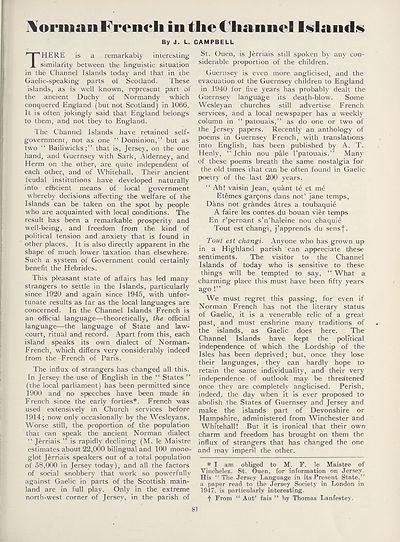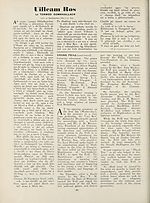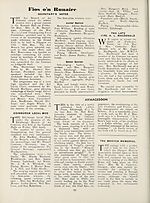An Comunn Gàidhealach Publications > Gaidheal > Volumes 44--45, January 1949--December 1950
(405) Page 81
Download files
Complete book:
Individual page:
Thumbnail gallery: Grid view | List view

XonuniiFreiiHi in tlieC'liannol Iwliiinlw
By J. L. CAMPBELL
THERE is a remarkably interesting
similarity between the linguistic situation
in the Channel Islands today and that in the
Gaelic-speaking parts of Scotland. These
islands, as is well known, represent part of
the ancient Duchy of Normandy which
conquered England (but not Scotland) in 1066.
It is often jokingly said that England belongs
to them, and not they to England.
The Channel Islands have retained self-
government, not as one “ Dominion,” but as
two ” Bailiwicks;” that is, Jersey, on the one
hand, and Guernsey with Sark, Alderney, and
Herm on the other, are quite independent of
each other, and of Whitehall. Their ancient
feudal institutions have developed naturally
into efficient means of local government
whereby decisions affecting the welfare of the
Islands can be taken on the spot by people
who are acquainted with local conditions. The
result has been a remarkable prosperity and
well-being, and freedom from the kind of
political tension and anxiety that is found in
other places. It is also directly apparent in the
shape of much lower taxation than elsewhere.
Such a system of Government could certainly
benefit the Hebrides.
This pleasant state of affairs has led many
strangers to settle in the Islands, particularly
since 1920 and again since 1945, with unfor¬
tunate results as far as the local languages are
concerned. In the Channel Islands French is
an official language—theoretically, the official
language—the language of State and law-
court, ritual and record. Apart from this, each
island speaks its own dialect of Norman-
French, which differs very considerably indeed
from the French of Paris.
The influx of strangers has changed all this.
In Jersey the use of English in the “ States ”
(the local parliament) has been permitted since
1900 and no spipeches have been made )in
French since the early forties*. French was
used extensively in Church services before
1914; now only occasionally by the Wesleyans.
Worse still, the proportion of the population
that can speak the ancient Norman dialect
‘‘ Jerriais ” is rapidly declining (M. le Maistre
estimates about 22,000 bilingual and 100 mono¬
glot J&rriais speakers out of a total population
of 58,000 in Jersey today), and all the factors
of social snobbery that work so powerfully
against Gaelic in parts of the Scottish main¬
land are in full play. Only in the extreme
north-west corner of Jersey, in the parish of
St. Ouen, is Jferriais still spoken by any con¬
siderable proportion of the children.
Guernsey is even more anglicised, and the
evacuation of the Guernsey children to England
in 1940 for five years has probably dealt the
Guernsey language its death-blow. Some
Wesleyan churches still advertise French
services, and a local newspaper has a weekly
column in ” patouais,” as do one or two of
the Jersey papers. Recently an anthology of
poems in Guernsey French, with translations
into English, has been published by A. T.
Henly, ” Ichin nou pale 1’patouais.” Many
of these poems breath the same nostalgia for
the old times that can be often found in Gaelic
poetry of the last 200 years.
” Ah! vaisin Jean, quint t6 et m6
Etemes gar^ons dans not’ jane temps,
Dins not grindes atres a toubaqui^
A faire les contes du bouan vi&r temps
En r’pernant s’n’haleine nou chaquie
Tout est changi, j’apprends du sensf.
Tout est changi. Anyone who has grown up
in a Highland parish can appreciate tjhese
sentiments. The visitor to the Channel
Islands of today who is sensitive to these
things will be tempted to say, ‘‘ What a
charming place this must have been fifty years
ago !”
We must regret this passing, for even if
Norman French has not the literary status
of Gaelic, it is a venerable relic of a great
past, and must enshrine many traditions of
the islands, as Gaelic does here. The
Channel Islands have kept the political
independence of which the Lordship of the
Isles has been deprived; but, once they lose
their languages, they can hardly hope to
retain the same individuality, and their very
independence of outlook may be threatened
once they are completely anglicised. Perish,
indeed, the day when it is ever proposed to
abolish the States of Guernsey and Jersey and
make the islands part of Devonshire or
Hampshire, administered from Winchester and
Whitehall! But it is ironical that their own
charm and freedom has brought on them the
influx of strangers that has changed the one
and may imperil the other.
* I am obliged to M. F. le Maistre of
Vinchelez, St. Ouen, for information on Jersey
His “ The Jersey Language in its Present State,”
a paper read to the Jersey Society in London in
1947, is particularly interesting.
f From “ Aut’ fais ” by Thomas Lanfestey.
81
By J. L. CAMPBELL
THERE is a remarkably interesting
similarity between the linguistic situation
in the Channel Islands today and that in the
Gaelic-speaking parts of Scotland. These
islands, as is well known, represent part of
the ancient Duchy of Normandy which
conquered England (but not Scotland) in 1066.
It is often jokingly said that England belongs
to them, and not they to England.
The Channel Islands have retained self-
government, not as one “ Dominion,” but as
two ” Bailiwicks;” that is, Jersey, on the one
hand, and Guernsey with Sark, Alderney, and
Herm on the other, are quite independent of
each other, and of Whitehall. Their ancient
feudal institutions have developed naturally
into efficient means of local government
whereby decisions affecting the welfare of the
Islands can be taken on the spot by people
who are acquainted with local conditions. The
result has been a remarkable prosperity and
well-being, and freedom from the kind of
political tension and anxiety that is found in
other places. It is also directly apparent in the
shape of much lower taxation than elsewhere.
Such a system of Government could certainly
benefit the Hebrides.
This pleasant state of affairs has led many
strangers to settle in the Islands, particularly
since 1920 and again since 1945, with unfor¬
tunate results as far as the local languages are
concerned. In the Channel Islands French is
an official language—theoretically, the official
language—the language of State and law-
court, ritual and record. Apart from this, each
island speaks its own dialect of Norman-
French, which differs very considerably indeed
from the French of Paris.
The influx of strangers has changed all this.
In Jersey the use of English in the “ States ”
(the local parliament) has been permitted since
1900 and no spipeches have been made )in
French since the early forties*. French was
used extensively in Church services before
1914; now only occasionally by the Wesleyans.
Worse still, the proportion of the population
that can speak the ancient Norman dialect
‘‘ Jerriais ” is rapidly declining (M. le Maistre
estimates about 22,000 bilingual and 100 mono¬
glot J&rriais speakers out of a total population
of 58,000 in Jersey today), and all the factors
of social snobbery that work so powerfully
against Gaelic in parts of the Scottish main¬
land are in full play. Only in the extreme
north-west corner of Jersey, in the parish of
St. Ouen, is Jferriais still spoken by any con¬
siderable proportion of the children.
Guernsey is even more anglicised, and the
evacuation of the Guernsey children to England
in 1940 for five years has probably dealt the
Guernsey language its death-blow. Some
Wesleyan churches still advertise French
services, and a local newspaper has a weekly
column in ” patouais,” as do one or two of
the Jersey papers. Recently an anthology of
poems in Guernsey French, with translations
into English, has been published by A. T.
Henly, ” Ichin nou pale 1’patouais.” Many
of these poems breath the same nostalgia for
the old times that can be often found in Gaelic
poetry of the last 200 years.
” Ah! vaisin Jean, quint t6 et m6
Etemes gar^ons dans not’ jane temps,
Dins not grindes atres a toubaqui^
A faire les contes du bouan vi&r temps
En r’pernant s’n’haleine nou chaquie
Tout est changi, j’apprends du sensf.
Tout est changi. Anyone who has grown up
in a Highland parish can appreciate tjhese
sentiments. The visitor to the Channel
Islands of today who is sensitive to these
things will be tempted to say, ‘‘ What a
charming place this must have been fifty years
ago !”
We must regret this passing, for even if
Norman French has not the literary status
of Gaelic, it is a venerable relic of a great
past, and must enshrine many traditions of
the islands, as Gaelic does here. The
Channel Islands have kept the political
independence of which the Lordship of the
Isles has been deprived; but, once they lose
their languages, they can hardly hope to
retain the same individuality, and their very
independence of outlook may be threatened
once they are completely anglicised. Perish,
indeed, the day when it is ever proposed to
abolish the States of Guernsey and Jersey and
make the islands part of Devonshire or
Hampshire, administered from Winchester and
Whitehall! But it is ironical that their own
charm and freedom has brought on them the
influx of strangers that has changed the one
and may imperil the other.
* I am obliged to M. F. le Maistre of
Vinchelez, St. Ouen, for information on Jersey
His “ The Jersey Language in its Present State,”
a paper read to the Jersey Society in London in
1947, is particularly interesting.
f From “ Aut’ fais ” by Thomas Lanfestey.
81
Set display mode to:
![]() Universal Viewer |
Universal Viewer | ![]() Mirador |
Large image | Transcription
Mirador |
Large image | Transcription
| An Comunn Gàidhealach > An Comunn Gàidhealach Publications > Gaidheal > Volumes 44--45, January 1949--December 1950 > (405) Page 81 |
|---|
| Permanent URL | https://digital.nls.uk/127126896 |
|---|
| Description | This contains items published by An Comunn, which are not specifically Mòd-related. It includes journals, annual reports and corporate documents, policy statements, educational resources and published plays and literature. It is arranged alphabetically by title. |
|---|
| Description | A collection of over 400 items published by An Comunn Gàidhealach, the organisation which promotes Gaelic language and culture and organises the Royal National Mòd. Dating from 1891 up to the present day, the collection includes journals and newspapers, annual reports, educational materials, national Mòd programmes, published Mòd literature and music. |
|---|---|
| Additional NLS resources: |
|

